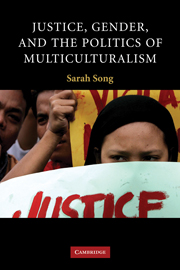7 - Epilogue
Published online by Cambridge University Press: 22 September 2009
Summary
Liberal democracies can pursue both equal justice for cultural minorities and equal justice for women. I have argued that rights-respecting accommodationism is the best expression of these dual commitments. To counter egalitarian critics of multiculturalism, I explored circumstances in which liberal democracies must go beyond uniform treatment toward granting special accommodations for cultural minorities. At the same time, sharing the concern of many feminist critics of multiculturalism, I stressed that the protection of the basic rights of vulnerable members of minority groups is an important limit on accommodation.
In defending rights-respecting accommodationism, I have argued for acknowledgment of the constructed, polyvocal, and interactive character of cultures and the complex sources of the problem of internal minorities. We saw in the foregoing chapters that cultures are not as coherent and self-contained as prominent defenders and critics of multiculturalism have assumed. As the historical and contemporary struggles of the Santa Clara Pueblo suggest, the criteria and value of tribal membership have long been contested. Upholding the tribe's existing gender-biased membership rules in the name of respecting long-held traditions ignores not only such contestation but also the influence of intercultural interactions in shaping Pueblo membership practices. The state has played a key role in shaping the practices at the center of many gendered cultural dilemmas. In some cases, accommodation of minority practices has been driven not by considerations of justice centered on equal respect for cultural minorities but by the congruence of inegalitarian norms between majority and minority cultures.
- Type
- Chapter
- Information
- Justice, Gender, and the Politics of Multiculturalism , pp. 169 - 177Publisher: Cambridge University PressPrint publication year: 2007

